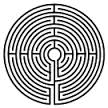记忆方法
将“labyrinth”拆分为“lab”和“in the box”,想象自己进入一个盒子(box)中,里面充满了错综复杂的迷宫(lab)。这样的视觉想象可以帮助记忆这个单词的含义。
以上内容由AI生成, 仅供参考和借鉴
中文词源
labyrinth 迷宫
来自希腊语labyrinthos,迷宫,原为希腊神话中克立特岛上一座用来关牛妖的宫殿,可能来自labrys,双刃斧,皇权的象征,用来指皇室宫殿。同时由该神话衍生clue.
英语词源
- labyrinth (n.)
- c. 1400, laberynthe (late 14c. in Latinate form laborintus) "labyrinth, maze," figuratively "bewildering arguments," from Latin labyrinthus, from Greek labyrinthos "maze, large building with intricate passages," especially the structure built by Daedelus to hold the Minotaur near Knossos in Crete, from a pre-Greek language; perhaps related to Lydian labrys "double-edged axe," symbol of royal power, which fits with the theory that the labyrinth was originally the royal Minoan palace on Crete and meant "palace of the double-axe." Used in English for "maze" early 15c., and in figurative sense of "confusing state of affairs" (1540s).
权威例句
- 1. They found a labyrinth of tunnels under the ground.
- 他们发现了一处迷宫似的地道。
- 2. We lost our way in the labyrinth of streets.
- 我们在迷宫式的街道上迷了路。
- 3. He wandered through the labyrinth of the alleyways.
- 他在迷宫似的小巷中闲逛.
- 4. The badger sett had twelve entrances to what must have been a labyrinth of tunnels.
- 这个獾穴有12个入口,下面必定有一套错综复杂的地道.
- 5. But Hester could not resolve the query , using herself in a dismal labyrinth of doubt.
- 对这一逼问,海丝特可没法作答了, 因为连她自己也尚在阴暗的迷宫中徘徊呢.

